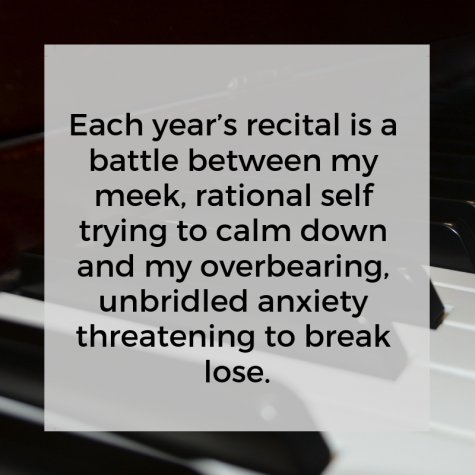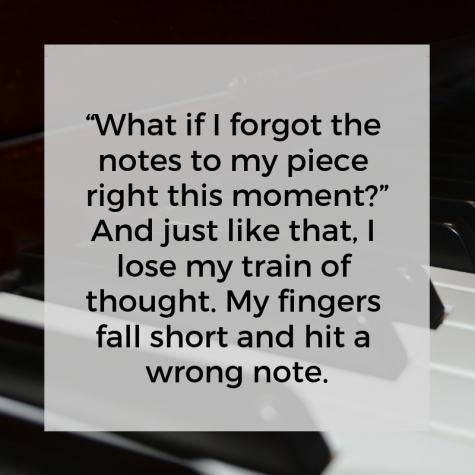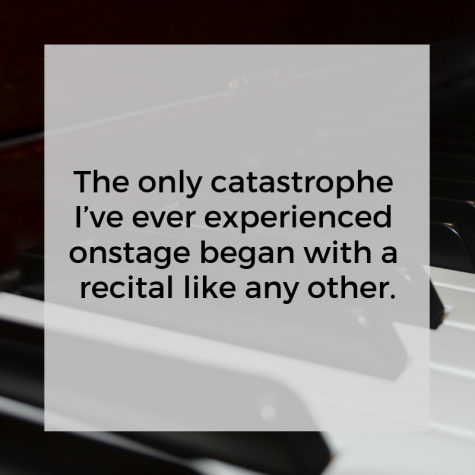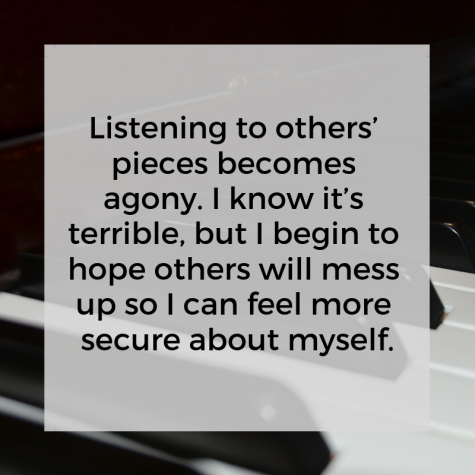What I’ve learned from performing in piano recitals
How I began to combat my fear of failure and accept my mistakes
March 15, 2019
’ve been playing the piano for eight years now — at this point, I’ve been playing for half my life. Every week consists of practicing scales and technique, learning etudes (practice pieces) and polishing pieces for performances.
Where does all of this practice take me? Each year, my piano teacher holds a mandatory recital for all her students. For many students, this is the culmination of several months of effort, from first learning the notes to a piece to polishing it into an impressive showpiece.
There’s only one problem with this: I’m mortally scared of performing onstage. I spent the first eight years of my life offstage, seated in the audience as I watched my older sister perform in orchestra concerts. I found comfort in the idea that I’d never have to go through the same gut-wrenching experience. Little did I know what was in store for me.
It shouldn’t have been a surprise to me that I’d eventually have to play the piano in front of others, but I was surprised by how early I was thrust into the ordeal. I had been playing for less than a year when my piano teacher brought up the annual recital for the first time. I listened as my teacher sealed my fate; I would be playing two memorized pieces in front of all the other students.

My first recital actually turned out fine. The bar was low since it was my first time and I was just a kid — if I messed up, so what? But the thing is, instead of getting more comfortable with each subsequent recital, I only became more nervous.
The real problem behind all of my apprehension can be packaged neatly into a one-word answer: fear. Uncontrollable fear of massive public embarrassment is, ironically, what brings me to the verge of screwing up during performances. Each year’s recital is a battle between my meek, rational self trying to calm down and my overbearing, unbridled anxiety threatening to break lose.
It was in sixth grade when I actually lost the battle to my emotions. The only catastrophe I’ve ever experienced onstage began with a recital like any other.

Each year, no matter how well I think I’ve mentally prepared myself, the fear takes root when I enter the recital hall. Everything takes on a new layer of reality when I see it in person. Yes, I’m about to perform in front of all my peers. Yes, there will be about a hundred pairs of eyes glued on me. Yes, I could potentially be the only kid who messes up this year.
The massive stage with a lone piano in the middle, an island in a sea of light, is enough to get my palms sweating. Listening to others’ pieces becomes agony. I know it’s terrible, but I begin to hope others will mess up so I can feel more secure about myself.
When my name is finally called to perform, I reach a peak of adrenaline. My hands begin to shake as I walk onstage. I squint past the spotlight and bow to the sea of faces, incurring a greater sense of isolation.
When I finally sit down at the piano, I relive some of my greatest fears. As I look into the keys laid out in front of me, I’m struck by the similarity between my current predicament and my first piano lesson; the same sense of unfamiliarity, the desperate feeling of being lost plagues my mind.

As I begin to play, my fingers slowly stop shaking. When it finally feels comfortable, like I’m just playing another practice run of my piece, my attention is drawn suddenly to my fingers. Staring at them dancing across the keys, my mind begins to wander: “What if I forget the notes to my piece right this moment?”
And just like that, I lose my train of thought. My fingers fall short and hit a wrong note. Instinctively, I stop playing. I rewind to the last section I can remember, doing whatever I can to cover up the mistake. But I freeze again in the exact same spot. I try two more times.
Horrified, I skip over half a page of music and desperately hope to make it to the end of the piece. At this point, I’m thinking only about getting as far away from the stage as possible. In the past, I’ve felt a surge of relief after each performance. I would walk back to my seat with my hands warm and not a care in the world. But after this performance, I sat in the audience quietly, left with only a bitter taste in my mouth.
The thing is, after years of reflection, there was really no way to guarantee I wouldn’t mess up. Sure, more practice could have helped, but the difference would have been marginal.

As I’ve watched more performances by others and gained more experience onstage, I’ve begun to realize a few things. I’m not defined by my mistakes. Every single pianist, famous or not, has messed up in some way in front of others. If it’s a simple wrong note, experienced pianists will instinctually keep playing, completely ignoring it. If it’s a complete disaster, not much can be done to reverse the situation — the best choice is to move on and focus on the rest of the performance. Even when worst comes to worst, one honest mistake is not enough to destroy a reputation.
And even beyond making mistakes, music is so much more than technical accuracy. When I listen to contemporary pieces, I listen to composers’ original recordings. It’s rare to find a composer who plays their own pieces perfectly — they almost always rush or slip up on a few notes. But to hear their raw, passionate emotions brought out through their own music is invaluable.
Possessing a combination of a love for music and intense stage fright can be brutal at times, but it’s taught me a lot. In the long term, it really doesn’t matter what kind of mistakes I make, as long as I learn from them. In reality, I should be focused on bringing out the best in what I do, displaying the beauty of my playing rather than trying to cover up its blemishes.

















